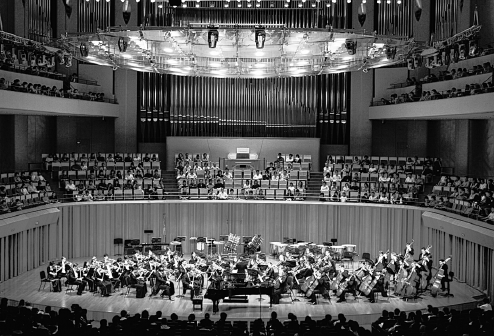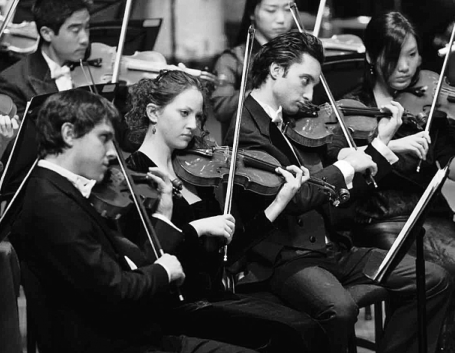A relationship of note
Classical music has provided a cultural bridge between China and the United States over half a century, Chen Nan reports.

In September 1973, the Philadelphia Orchestra, led by its musical director Eugene Ormandy, became the first American orchestra to perform in China since the founding of the People's Republic of China in 1949.
"Before the plane landed in Beijing, it circled over the airport for over half an hour. After we touched down, the pilot was asked why it took so long. He said that he had never been there before and he just wanted to make sure," recalls violinist Herbert Light, now 85, who joined the Philadelphia Orchestra in 1960 and retired in 2016.
With that, the orchestra embarked on a six-concert tour of Beijing and Shanghai, which Light calls "a great adventure".
"The interesting thing was that the audiences were very polite at the beginning of concerts and little by little, we noticed that their enthusiasm grew," the violinist says.
He also remembers watching the Chinese ballet, The White-Haired Girl, and attending lavish banquets, where he became very familiar with toasting ganbei!
Since that historic visit, the orchestra has returned to China in 1993, 1996, 2001, 2008, and 2010, when it played at the opening of the World Expo in Shanghai, prior to further, almost annual, tours between 2012 and 2017. In 2019, the orchestra once again returned to China with a tour marking the 40th anniversary of the establishment of diplomatic relations between the two countries.
Light has witnessed the lasting friendship between the orchestra and its Chinese audiences. He has also frequently traveled back to China to perform and give master classes.
"I am impressed with the rise of the country," says Light.
On Feb 21, he, along with a group of guest speakers, attended an online symposium organized by Tianjin Juilliard School, the first overseas campus launched by the New York performing arts educational institution.
With a theme of "fifty years of musical exchange between the United States and China", the event was held to mark the 50th anniversary of the former US president Richard Nixon's historic visit to China.
On Feb 21, 1972, Premier Zhou Enlai greeted Nixon at Beijing's airport. The visit by Nixon to China, which concluded with the signing of the China-US joint communique, opened the door to an ongoing relationship between the two countries in nearly all aspects of life, including music, culture and education.
Over the past five decades, classical music's popularity has surged across China, prompting the construction of many new concert halls and the musical education and development of tens of thousands of children-many of whom have gone on to perform internationally, some even leaders in their fields. Music exchange programs have also been conducted by musicians from both countries.
One of the key figures who has made a great contribution to the cultural exchange between China and the US was Chinese American composer Chou Wen-chung, who was commemorated during the online symposium.
In 1978, the Center for US-China Arts Exchange was established by Chou at Columbia University. It was a long time wish for Chou to launch such a program, and he believed that culture and the arts would be the common language through which both countries could share their mutual respect.
Born in Yantai, Shandong province, Chou moved to New York in 1946. He joined the faculty at Columbia University in 1964 and taught an increasingly international array of students, including the acclaimed composers Tan Dun, Zhou Long, Chen Yi and Bright Sheng, until his retirement in 1991.
In the late 1970s, Chou was among the first overseas Chinese composers to visit the Central Conservatory of Music in Beijing and made a deep impression on a group of young composers. Zhou was among the young students.
"I was influenced by Chou's aesthetic concept, which was based on the philosophy of traditional Chinese culture and ancient poetry of China," recalls Zhou during the online symposium. In 1985, Zhou became the first composition student from Beijing to be admitted to Columbia University to study under Chou.
Zhou had culture shock when he first arrived in New York, where he encountered many new ideas. But from 1985 until 1987, he didn't compose anything. Chou inspired and encouraged him. In 1990, Zhou composed the piece, Dhyana, which was dedicated to Chou. In 1993, Zhou received his doctorate in musical arts and was later awarded a Pulitzer Prize for his first opera, 2011's Madam White Snake.
"He discussed with us how to carry on Chinese cultural tradition in our own creative works and how to see the development of the future of new music. My solo piece for pipa (Chinese instrument), The Points, which premiered in 1991 at Columbia University, is among the pieces written directly under Chou's influence," adds composer Chen, wife of Zhou, who also graduated from the Central Conservatory of Music and studied with Chou at Columbia University during the 1980s.
She also worked as administrative assistant at the Center for US-China Arts Exchange for three years, and closely witnessed Chou's hard work and contribution to musical education and arts exchanges between China and the US.
The center's early projects included violinist Isaac Stern's first visit to China and the production of the Oscar-winning documentary From Mao to Mozart: Isaac Stern in China, which was made by documentary filmmaker Murray Lerner in 1980.
While in China in 1979-after the country began its policy of reform and opening-up, Stern performed concerts and gave master classes in Beijing, Shanghai and Xi'an, Shaanxi province.
In the documentary, a talented 15-year-old violinist was featured. He is now a world-renowned musician, the founding first violinist of the Shanghai Quartet, and also the resident violin faculty member at Tianjin Juilliard School.
"You can see from the movie that it was just completely packed by musicians from all over China who traveled to Shanghai to witness this concert," says violinist Weigang Li, who met Stern for the first time when he gave a concert in Shanghai in June 1979. "He also gave a master class to nine Chinese violinists. Since I was the youngest, I was scheduled to play at the end.
"I was very nervous, but he never stopped me. He was very humorous, which made me relaxed. I remember, pretty soon after that, many symphony orchestras came to China and around that time Chinese students started to have the opportunity to go abroad to study," recalls Li.
Born into a family of well-known musicians in Shanghai, Li began studying the violin with his parents when he was 5 years old and went on to attend the Shanghai Conservatory Middle School at 14. Three years later, in 1981, he was selected to go to study for one year at the San Francisco Conservatory of Music through the first cultural exchange program between the "sister cities" of Shanghai and San Francisco.
Along with the members of Shanghai Quartet, Li returned to his home country in the fall of 2020, after living in the US and touring worldwide for over three decades, joining the faculty of Tianjin Juilliard School.
Another young boy featured in the documentary is the renowned cellist Wang Jian, who was 10 years old at the time and was studying in the primary school of the Shanghai Conservatory of Music.
"Back then, I didn't realize how important his visit to China would be for me personally, as well as to the classical music scene in China. I just started to play and I heard Stern saying something to the film crew, who started rushing around, putting lights on to film my performance," recalls Wang, who learned to play cello at the age of 4 with his father, also a cellist. "I didn't stop. I just continued. What really surprised me was how he yelled very loudly, 'bravo'."
"Now, when I look back at the film, I do think it was very important, because it captured a moment in Chinese history where everything changed," Wang says. "We are all benefiting from that change, and the fact that classical music has become very important in China."
In 1987, Joseph W. Polisi, president of New York-based Juilliard School at the time, led the Juilliard Orchestra on its first tour of China, visiting six cities, including Beijing, Shanghai and Guangzhou, Guangdong province. Founded in 1905, the school has trained some of the world's best artists, including Van Cliburn, Renee Fleming and Yo-Yo Ma. It has enrolled students from China since the 1920s.
"We brought a large orchestra. We got really large repertories, like The Rite of Spring by Igor Stravinsky and Beethoven's Symphony No 3. Audiences were quiet and polite, and later, I was told that they were totally engaged," recalls Polisi during the online symposium, who led the orchestra upon it return to China on a 2008 tour that included a concert collaborating with students and faculty members of the Central Conservatory of Music at the National Center for the Performing Arts in Beijing.
"China changed a lot from 1987 to 2008. When we arrived in 1987, there were bicycles rather than cars. When we arrived in 2008, the NCPA just opened and we were one of the first performing ensembles to play there," says Polisi.
The relationship between the school and China continued in 2015 when Peng Liyuan, the wife of President Xi Jinping, visited the Juilliard School in New York on Sept 28, 2015, while accompanying Xi on his weeklong state visit to the US.
As the school's sixth and longest-serving president, it was Polisi who welcomed Peng. Later, the plan to launch a Tianjin campus was announced.
In October, Polisi, 74, returned to China once more to attend the dedication ceremony of Tianjin Juilliard School campus, which broke ground on June 15, 2017 and opened in fall 2020. It offers US-accredited, full-time master's degrees in orchestral performance, chamber music and collaborative piano, as well as programs for pre-college students.
"Roots grow in really good soil. China has done incredible cultivation of its classical music soil over the last 40 years. Here, we want to train and develop the next great musicians and to serve as a cultural bridge," he says.



Today's Top News
- China's industrial profits down 1.8% in H1
- Thailand responds to Trump's ceasefire call
- Recall vote shows DPP's manipulation runs against Taiwan people's will: mainland spokesperson
- Top DPRK leader visits China-DPRK Friendship Tower
- China proposes global cooperation body on AI
- Scholars propose inclusive human rights framework






























